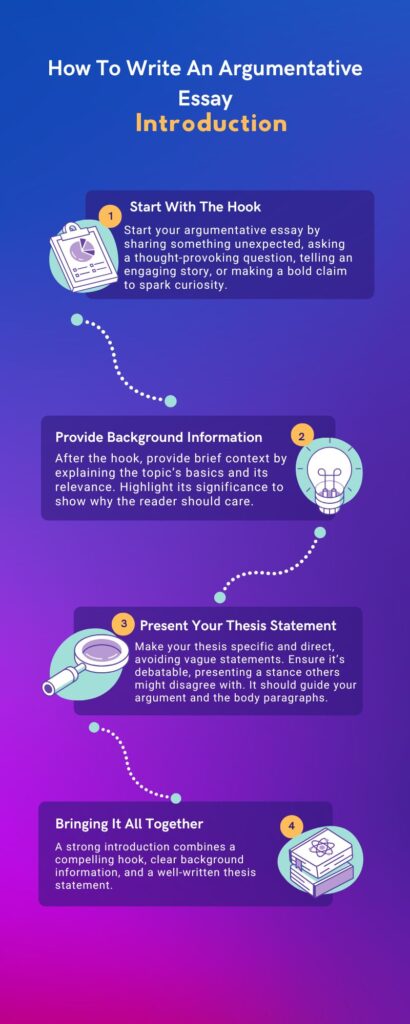Writing an argumentative essay doesn’t have to feel overwhelming. It’s about taking a clear stance on a topic and supporting it with solid evidence. You also need to address opposing views to show why your argument makes sense. It’s not just about opinions – it’s about creating a persuasive case with facts and logic.
Argumentative essays are important because they help you think critically and express ideas clearly. These skills are useful in school and in real-life situations where you need to convince others. For example, you might need to explain your ideas in a discussion, debate, or presentation, or draw inspiration from GCSE speech ideas to make your points even stronger.
This guide will walk you through the steps to write an effective argumentative essay. First, we’ll cover planning your ideas, then move on to structuring your arguments, and finally, polishing your final draft. By breaking it down step by step, we’ll make the process simple and easy to follow. So, let’s get started and turn essay writing into a skill you can feel confident about!
What is Argumentative Essay?
An argumentative essay is a piece of writing where you choose a side on a topic and explain why your opinion is correct. To do this, you use facts, examples, and reasons to support your ideas. At the same time, you also address opposing views and explain why your argument is stronger. This type of essay helps you think critically and learn how to share your ideas clearly. Overall, it’s a great way to practise building strong arguments and backing them up with evidence.
Argumentative Essay Structure
Before you begin writing an argumentative essay, it’s important to understand its structure. A clear structure not only helps your ideas flow logically but also keeps your argument focused. Typically, an argumentative essay is divided into three main parts: the introduction, body paragraphs, and conclusion.

Introduction
To start, the introduction is where you grab the reader’s attention. Additionally, it provides background on the topic and presents your thesis statement. Your thesis should clearly state your position on the issue in one sentence. This statement sets the stage for the rest of your essay, guiding both you and the reader.
Body Paragraphs
Next, the body paragraphs are where you build your argument. Each paragraph should focus on one main point and begin with a topic sentence. Furthermore, you’ll need to support your points with evidence, examples, and reasoning. Don’t forget to address counterarguments. By acknowledging opposing views and explaining why your stance is stronger, you make your essay more convincing.
Conclusion
Finally, the conclusion ties everything together. This is where you summarise your key points and restate your thesis in a fresh way. Moreover, it’s your chance to leave a lasting impression on the reader. A strong conclusion should make your argument feel complete and eliminate any remaining doubts about your position.
If you follow this structure, you can create a well-organized essay that clearly communicates and shows your ideas. Now, let’s move on to crafting a compelling introduction.
How to Write a Strong Introduction for My Argumentative Essay
The hook is your opening line, and it is designed to grab the reader’s attention. To begin with, it should spark curiosity or interest, making them want to keep reading. Moreover, a good hook can take many forms:

Start with a Hook : Example
if your essay is about climate change, you could start with, “Did you know that the past decade was the hottest in recorded history?” A strong hook sets the stage for your argument and makes the reader want to learn more.
Provide Background Information : Example
If your essay is about the benefits of online learning, you might explain how traditional classroom settings can sometimes limit access to education due to location or schedules. This background sets up your argument for why online learning is a valuable alternative.
Present Your Thesis Statement : Example
For instance, if your essay argues that homework should be reduced in schools, your thesis could be: “Reducing homework allows students to focus on extracurricular activities, improve mental health, and foster a better work-life balance.” This thesis clearly presents your stance and hints at the main arguments you’ll explore.
Bringing It All Together : Example
“Did you know that students who participate in arts programmes are four times more likely to be recognised for academic achievement? Arts education is a critical yet often overlooked aspect of schooling, as it nurtures creativity, critical thinking, and emotional development. To support well-rounded student growth, schools must prioritize arts programmes, which benefit both academic performance and personal development.”
With an introduction like this, you’ll engage the reader while clearly outlining your argument. Now, let’s dive into how to write effective body paragraphs that strengthen your essay.
Tips for Writing Body Paragraphs in an Argumentative Essay
The body paragraphs are where your argument takes shape. Each paragraph should focus on a single idea that supports your thesis. These sections allow you to present your points, back them up with evidence, and address opposing views.

1)Start with a Topic Sentence
Introduce the main point of the paragraph clearly. For example: “Reducing class sizes improves student outcomes by allowing teachers to focus on individual needs.”
2) Present Your Argument
Explain your point and connect it to your thesis. Keep your reasoning clear and logical.
3) Add Supporting Evidence
Use facts, statistics, examples, or quotes from credible sources to back up your argument. For instance, cite studies showing that smaller classes lead to better academic performance.
4) Address Counterarguments
Acknowledge opposing views and explain why your argument is stronger. For example, if cost is a concern, highlight the long-term benefits like improved graduation rates.
3 Easy Steps to Write an Argumentative Essay Conclusion
The conclusion is your final chance to leave an impression on the reader and tie your essay together. Here’s how to write an effective conclusion in a simple and clear way:
Step 1 : Summarize Your Main Points
Begin by briefly recapping the key arguments from your essay. Highlight the main points you made in the body paragraphs, but don’t go into too much detail.
Step 2 : Restate Your Thesis
Next, rephrase your thesis statement in a fresh way. Avoid copying it word for word from the introduction. Show how the evidence and reasoning in your essay support your thesis. This ties everything together and makes everything more clear.
Step 3 : End with a Strong Closing Thought
Finish your conclusion with a memorable final sentence. This could be a call to action, a thought-provoking question, or a reflection on the broader significance of your argument. For example, If your essay was about the importance of studying history, you might end with, “Understanding history not only teaches us about the past but also helps us make better decisions for the future.”
How Can I Write Good Argumentative Essay?
Writing a strong argumentative essay doesn’t have to be difficult. By following a few simple tips, you can make your essay clear, convincing, and professional.
| Tip | Explanation |
| Write Clearly and Concisely | Use simple, direct language to make your ideas easy to understand. Avoid complicated words or long sentences. |
| Maintain a Logical Flow | Connect your ideas with transition words like “however,” “furthermore,” or “on the other hand” for smooth transitions. |
| Keep a Formal Tone | Use professional and objective language. Avoid slang or casual phrases to make your argument more credible. |
| Proofread and Revise | Review your essay to fix grammar mistakes, unclear sentences, or weak arguments. Ensure it’s polished and well-written. |
These tips will help you write an argumentative essay that is both well-structured and persuasive. Now, let’s move on to the common mistakes and how to avoid them to improve your writing even better.
Common Mistakes To Avoid While Writing Argumentative Essay
Even skilled writers can make mistakes when working on an argumentative essay. Let’s review some common issues to avoid and tips to improve your writing:
Lack of a Clear Thesis
Do: Write a clear and specific thesis that directly states your argument.
Example: “Integrating technology in classrooms improves student engagement and learning outcomes.”
Don’t: Use vague or general statements that don’t provide a clear position.
Example: “Technology is important.”
Ignoring Counterarguments
Do: Address opposing views to show you’ve considered all sides of the issue.
Example: Acknowledge cost concerns but explain why the benefits outweigh them.
Don’t: Avoid or dismiss opposing arguments, as it weakens your position.
Over-reliance on Emotional Appeals
Do: Support your argument with facts, data, and logical reasoning.
Example: Use statistics to show the impact of pollution on health.
Don’t: Depend too much on emotional appeals without providing evidence.
Example: Saying “Pollution is heartbreaking” without facts to back it up.
Argumentative Essays Examples and Analysis
Now that you’re aware of the common mistakes to avoid, let’s look at how examples can help you improve your argumentative essay. Reviewing sample essays is one of the best ways to understand what makes an essay strong and where it can go wrong.
Sample Essays – Explore well-written argumentative essays to see how others structure their arguments. Pay attention to how they introduce their thesis, present evidence, and address counterarguments.
You can find examples on website like Academic English UK.
Breakdown of Examples – Analyse the strengths and weaknesses of these sample essays. Look for elements like a clear thesis, strong evidence, and logical flow. For example, identify whether the writer effectively refutes counterarguments or if their points lack enough support. This process will help you spot what works well and what to avoid in your own essay.
Additional Resources for Argumentative Essay Writing
Recommended Readings
“They Say / I Say: The Moves That Matter in Academic Writing” by Gerald Graff and Cathy Birkenstein
This book provides practical templates for structuring arguments and addressing counterarguments effectively.
“The Elements of Argument” by Annette T. Rottenberg and Donna Haisty Winchell
A comprehensive guide to understanding and constructing strong argumentative essays.
Writing Tools
Grammarly: Popular grammar and style checker that helps you refine your writing and correct errors.
EasyBib: For generating citations in various formats, ensuring proper referencing in your essay.
Hemingway Editor: Tool that highlights overly complex sentences and improves clarity in your writing.
Conclusion
Writing an argumentative essay may seem challenging at first, but with the right approach and preparation, it’s a skill you can master. By understanding the structure of an essay, focusing on a clear thesis, and supporting your arguments with evidence, you can create a persuasive and compelling piece. Don’t forget to address counterarguments and avoid common mistakes to make your essay even stronger.
So, if you’re seeking extra help, consider online tutoring. Personalized guidance will help you refine your writing skills, understand key concepts, and build confidence. A tutor can provide you support to address your unique challenges, making learning experience more enjoyable.
Now it’s time to apply what you’ve learned and take your writing to the next level. Good luck, and happy writing!
Blogs You Might be Interested in
Active Verbs: How to Improve Your Writing Instantly
Guide to Mastering Language Analysis.
Top 20 Literary Devices








